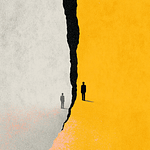Every day, I find myself in conversation about artificial intelligence. The setting varies—coffee shops, boardrooms, backyards—but the conclusion often lands in the same uneasy place: AI isn’t ready. It’s raw. Unpredictable. Not quite trustworthy enough to integrate fully into our businesses, our workflows, or our creative processes.
In corporate America, the response has largely been to discourage its use. Risk-averse HR policies and compliance guidelines warn against feeding proprietary data into large models. In creative industries, it's become almost taboo. At this year’s Cannes Lions Festival, entries were disqualified not because they violated a rule, but because someone suspected AI had a hand in their creation. That’s where we are: guilty until proven human.
And yet—despite the fear, the regulation, the ethical hand-wringing—AI is everywhere. Self-reporting suggests about 27% of Americans use AI daily. But the real number is likely far higher. It’s estimated that 87% of Americans interactwith AI every day, often without even realizing it. Our phones, cars, homes, banks, newsfeeds, and devices quietly hum with algorithmic intelligence. It helps us shop, drive, search, and swipe. It already influences what we see, buy, feel, and believe.
And yet we don’t talk about it.
There’s something profoundly human about this paradox. AI helps us in secret, at scale, but we’re reluctant to name it. It’s like a brilliant ghost in the machine—our invisible assistant, our co-pilot, our digital doppelgänger. We’re grateful for the convenience, even awed by its capability, but still ashamed to admit we use it.
Why? Because deep down, many people feel like they’re cheating.
That reaction—guilt, discomfort, resistance—has become one of the most fascinating cultural signals of our time. A tool that should expand human potential is instead treated as a shortcut. A crutch. A threat to authenticity. But what if it’s none of those things? What if the real problem isn't the tool, but our imagination?
AI is not magic. It does not think. It does not dream. It doesn’t understand beauty or grief or irony—not in the way we do. But it does respond well to direction. That’s what most people miss. The output of AI is only as clear, thoughtful, or valuable as the input it receives. If your mind is scattered, your request vague, your intention undefined—AI will amplify that confusion. But if you know what you’re trying to achieve—if you have a vision, a standard, a perspective—AI becomes something else entirely: a force multiplier.
That’s the key: AI already works well in many cases, but only when guided with precision, creativity, and a clear point of view.
This is why I believe the current obsession with productivity misses the point. We talk about AI as if it’s just an efficiency engine—something to help us do more, faster. And yes, it can write emails, transcribe meetings, summarize reports. But those are tasks. They’re not aspirations.
The real promise of AI is not in the optimization of what already exists—it’s in the reimagination of what’s possible.
What if we thought about AI not as a tool, but as a creative partner? Not as a way to reduce headcount, but as a way to expand the boundaries of human potential? What if we stopped asking AI to do our work, and started asking it to help us dream bigger, build better, care deeper?
That’s what excites me.
Not a future where AI makes us more efficient—but one where it helps us become more human. A future where we design new models of education that adapt to every child. Where care systems anticipate need, not just react to it. Where loneliness is softened by digital companionship. Where climate challenges are modeled, predicted, and solved faster than we thought possible. A future where language, geography, and ability no longer limit who can learn, lead, or contribute.
Of course, that future won’t build itself. It requires a cultural shift—not just in how we use AI, but in how we feel about it. We must move beyond guilt and secrecy. We must name our companion, embrace its strengths, and acknowledge its weaknesses. And most of all, we must hold tight to a collective vision of why this matters.
Because here’s the truth: AI will shape the future. But it will be our values, our intentions, and our imagination that determine what kind of future it becomes.
I hope we choose to make it one of care. Of dignity. Of curiosity and compassion.
I hope we teach our children that using tools to expand our minds isn’t cheating—it’s progress.
And I hope, more than anything, that we don’t squander this moment by being afraid to name the thing that’s already reshaping our world.
AI is not the end of the human story.
It’s just the newest character in it.
So let’s write the next chapter—together.
If this conversation stirred something in you, I hope you’ll carry it forward. AI isn’t just a tool—it’s a mirror. And what it reflects depends entirely on the clarity of our vision, the strength of our values, and the courage we bring to the work of imagining something better.
This moment isn’t about technology alone—it’s about leadership, intention, and the responsibility to build a future that honors our humanity, not erases it.
If this episode meant something to you, share it with someone who’s thinking about the future. These episodes drop every weekday—and every share, every conversation, every connection helps this movement grow.
Until next time: be kind, be clear, dream boldly, and don’t be afraid to name the revolution already underway.
I’ll see you soon.











Share this post